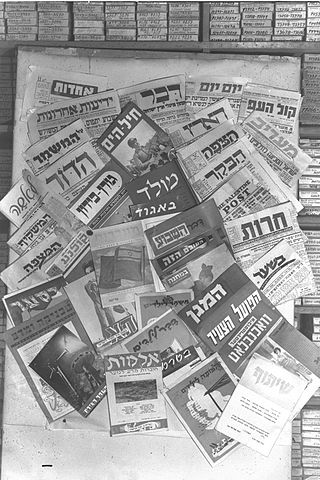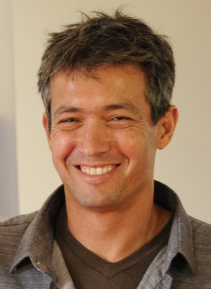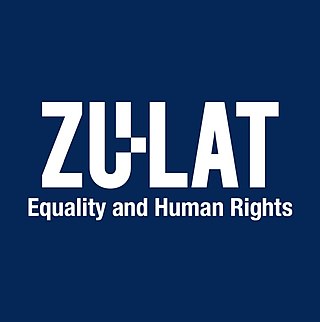The Editors Committee is an informal forum comprising the editors and owners of the main Israeli media. It meets regularly with the prime minister, cabinet members and senior officials. Until the 1980s, it took a central role in the self-censorship practiced by the Israeli media. The understanding was that the information reported to the committee would not be published in the media, even once received from another source.
The British authorities enacted in 1933 the Press Ordinance, which regulated the content of the news press in British Palestine. Many of the country's Jewish newspapers, particularly the English-language The Jerusalem Post and those printed in Hebrew, were founded by Zionist political parties during the pre-statehood period, and subsequently continued to be politically affiliated with such parties.
Professor Dan Caspi, who has served as chairman of the Israeli Communications Association, notes in his Mass Media and Politics (The Open University, 1997), "The majority of the newspapers in Israel's pre-state period were founded as ideological organs of political trends, and were under the ideological authority of the political parties and dependent on their financial backing. The party institutions and their leaders were involved in the selection process for the sensitive senior positions in the paper, particularly in the choice of the editor."
In the pre-state yishuv period, most Hebrew press editors felt that their primary role was educational, to help in the state-building process. Such values as freedom of the press and the idea of being a public watchdog were secondary. The editors of the Hebrew-language press founded the Reaction Committee in 1942 because, as they stated at the time, they "felt the need for guidance from the Jewish community's leadership on publication policy concerning sensitive matters, such as the expulsion of ma'apilim (illegal immigrants) and the search for weapons in Hebrew settlements".
In 1948, the Press Ordinance was adopted by Israel and administered by the Ministry of Interior which undertook to "license, supervise, and regulate" the press. After the establishment of the state in 1948, prime minister David Ben-Gurion saw great advantages in the arrangement with the Israeli press, and he frequently convened the newly renamed Editors Committee to share important information with the editors, on condition that it would not be published.
The IDF assumed responsibility for administering the censorship regulations. This was done through an agreement with the Editor's Committee, which allowed most Hebrew-language newspapers to exercise self-censorship, with the censor receiving only articles dealing with national security matters. This arrangement did not cover Arabic language publications, whose editors were required to submit items for publication to the military administration on a nightly basis.
Co-operation between the government and the press was sometimes tense. These tensions increased as the value of free speech and the role of the press as watchdog came to be more widely recognized. The process accelerated in the 1970s, as a result of social changes in Israel and developments in the global media. The Yom Kippur War of 1973 served as a major change catalyst, by initiating a wide coverage of military issues and criticism of military failures. Towards the 1982 Lebanon War, partial information was published concerning the plans for an operation and the disagreement in the cabinet towards it. When fighting eventually started, the Israeli media initially followed the government's guidance in publishing information about the war. However, within about three weeks, when it became clear that the operation was not meeting its original goals, Israeli society engaged in a public debate about the war, which was covered widely by the press.
In parallel, the role of the Committee itself declined following the 1977 elections, that brought right-wing Likud party to power for the first time. New prime minister Menachem Begin was suspicious of most of the press, which he considered as being hostile to his party, and rarely convened the forum.
In 1992, five soldiers of Sayeret Matkal, an elite commando unit of the Israel Defense Forces, were killed in a training accident. Information about the accident, and in particular the presence at the site of Ehud Barak, then chief of IDF staff, was censored. However, after information was leaked to the foreign press and published abroad, the episode was reported in Israel, too. As a result of this affair, two major newspapers, Haaretz and Yediot Aharonot , withdrew from the censorship agreement and the Editors Committee.
A new censorship agreement, signed in 1996, limited censorship to information that, when published, would, "with high probability", constitute a real danger to national security. In addition, it ensured the press's right to appeal the censor's decisions to the Supreme Court.
To receive an official press card, Israeli journalists must sign an agreement pledging not to publish any security information that could "help Israel's enemies" or "harm the state." [1]
In 1988, Israeli authorities, suspecting Palestinian journalists of involvement in the Intifada, censored or shut down many Palestinian newspapers and magazines in the West Bank and the Gaza Strip and arrested several journalists.[ citation needed ]

Media coverage of the Arab–Israeli conflict by journalists in international news media has been said to be biased by both sides and independent observers. These perceptions of bias, possibly exacerbated by the hostile media effect, have generated more complaints of partisan reporting than any other news topic and have led to a proliferation of media watchdog groups.

Yair Lapid is an Israeli politician of the centrist Yesh Atid party, and a former journalist. He has been the Leader of the Opposition since January 2023, having previously served in that role from 2020 to 2021. He served as the 14th Prime Minister of Israel from 1 July to 29 December 2022. He previously served as the Alternate Prime Minister of Israel and Minister of Foreign Affairs from 2021 to 2022. Lapid is the chairman of Yesh Atid, and Minister of Finance from 2013 to 2014.

Printed media in the Soviet Union, i.e., newspapers, magazines and journals, were under strict control of the CPSU and the Soviet state. The desire to disseminate propaganda was believed to had been the driving force behind the creation of the early Soviet newspapers. Newspapers were the essential means of communicating with the public, which meant that they were the most powerful way available to spread propaganda and capture the hearts of the population. Additionally, within the Soviet Union the press evolved into the messenger for the orders from the CPSU Central Committee to the party officials and activists. Due to this important role, the Soviet papers were both prestigious in the society and an effective means to control the masses; however, manipulation initially was not the only purpose of the Soviet Press.
As with many Soviet-allied countries prior to the fall of the Berlin Wall, the government of the former German Democratic Republic applied censorship during its existence from 1949 to 1990. The censorship was practised through a hierarchical but unofficial censorship apparatus, ultimately controlled by the ruling party (SED). Through censorship, the socialist point of view on society was ensured in all forms of literature, arts, culture and public communication. Due to the lack of an official censorship apparatus, censorship was applied locally in a highly structured and institutionalized manner under the control of the SED.

Benjamin Gantz is an Israeli politician and retired army general who served as the Minister of Defense between 2020 and 2022 and as deputy prime minister of Israel between 2021 and 2022. He previously served as the alternate prime minister of Israel from 2020 to 2021.

The Israeli Military Censor is a unit in the IDF Directorate of Military Intelligence tasked with carrying out preventive censorship inside the State of Israel regarding the publication of information that might affect the security of Israel. The body is headed by the Israeli Chief Censor, a military official is appointed by Israel's Minister of Defense, who bestows upon the Chief Censor the authority to suppress information he deems compromising from being made public in the media. On average, 2240 press articles in Israel are censored by the Israeli Military Censor each year, approximately 240 of which in full, and around 2000 partially.
Multiple forms of media including books, newspapers, magazines, films, television, and content published on the Internet are censored in Saudi Arabia.

The mass media in Israel refers to print, broadcast and online media available in the State of Israel. The country boasts dozens of newspapers, magazines, and radio stations, which play an important role by the press in political, social and cultural life and cater it to a modern, developed and literate society.
Censorship in Israel is officially carried out by the Israeli Military Censor, a unit in the Israeli government officially tasked with carrying out preventive censorship regarding the publication of information that might affect the security of Israel. The body is headed by the Israeli Chief Censor, a military official appointed by Israel's Minister of Defense, who bestows upon the Chief Censor the authority to suppress information he deems compromising from being made public in the media, such as Israel's nuclear weapons program and Israel's military operations outside its borders. On average, 2240 press articles in Israel are censored by the Israeli Military Censor each year, approximately 240 of which in full, and around 2000 partially.
The Bus 300 affair, also known as Kav 300 affair, was a 1984 incident in which Shin Bet members executed two Palestinian bus hijackers, immediately after the hostage crisis incident ended and they had been captured.

Bamahane was a Hebrew-language weekly magazine published by the Israel Defense Forces. It was first published in December 1934 by the Haganah and was published as a weekly until December 2016, when it was moved online until it was formally merged into the IDF's website in January 2020.
Media played an important part of the 2008–2009 Israel–Gaza conflict. Foreign press access to Gaza has been limited since November 2008 via either Egypt or Israel. On 29 December 2008, the Israeli Supreme Court ordered that journalists be allowed into Gaza whenever the crossings were opened, but the IDF refused to comply. There have been arrests of journalists due to violations of wartime censorship in Israel, and these have been denounced by international press organizations. Media infrastructure, including Al-Aqsa TV transmission equipment and foreign and local press offices, were hit during the conflict. Media relations also played an important role, with the use of new media on the part of Israel, as well as a clear public relations campaign.

Uri Blau is an Israeli investigative journalist writing for Haaretz newspaper and other publications. He is specialized in military affairs, corruption and "follow the money" investigations. Blau was convicted of possession of classified IDF documents and sentenced to community service for his role in the Kamm-Blau affair.
Tikun Olam is a Seattle-based political blog that regularly reports on Israeli security matters. The blog was created in 2003 by Richard Silverstein and covers the Arab–Israeli conflict. Silverstein describes it as a "liberal Jewish blog" that "focuses on exposing the excesses of the Israeli national security state".

Yoaz Hendel is an Israeli politician, journalist, author, publicist and public activist. Hendel served as Israel's Minister of Communications, as a member of Israel's Security Cabinet and Ministerial Committee for Legislation, a Member of Knesset and as Chairman of his Party. As of January 2023, Hendel is on a break from politics. He was originally elected as a member of the Blue and White alliance in 2019, before leaving to form Derekh Eretz and serve as its Chairman in March 2020. A military historian by training, Hendel previously worked as a journalist, was the chairman of the Institute for Zionist Strategies (IZS), and taught academic courses at Bar-Ilan University. Between 2011 and 2012 he served as Director of Communications and Public Diplomacy for Prime Minister Benjamin Netanyahu. He was Minister of Communications from May 2020 to December 2020 and from June 2021 to the end of 2022. Hendel completed a doctorate in history.
Censorship in Vietnam is pervasive and is implemented by the Communist Party of Vietnam (CPV) in relation to all kinds of media – the press, literature, works of art, music, television and the Internet. The government censors content for mainly political reasons, such as curtailing political opposition, and censoring events unfavorable to the party. In its 2021 Press Freedom Index, the Reporters Without Borders (RSF) ranked Vietnam as "very serious" at 174 out of 180 countries, one of the lowest in the world and the lowest ranking on their five-point scale. Similarly, Freedom House's 2021 Freedom on the Net report classifies Vietnam as "not free" in relation to the Internet, with significant obstacles to access, limits on content and significant violations of user rights.

Gaza-Israel clashes began on 11 November 2018, when a botched Israeli covert operation carried out in the Khan Yunis area of the southern Gaza Strip killed seven Palestinian militants and one Israeli soldier. Exchanges of fire lasted for two more days, until a cease fire was achieved with Egyptian mediation. Some minor incidents and protests followed some two weeks after the cease fire, with decreasing intensity.
Freedom of the press in Pakistan is legally protected by the law of Pakistan as stated in its constitutional amendments, while the sovereignty, national integrity, and moral principles are generally protected by the specified media law, Freedom of Information Ordinance 2002, and Code of Conduct Rules 2010. In Pakistan, the code of conduct and ordinance act comprises a set of rules for publishing, distributing, and circulating news stories and operating media organizations working independently or running in the country.
Abu Ali Express is an influential Israeli channel which covers Arab affairs on social media, including Telegram and Twitter, as well as on its own website. In spite of its Arabic pseudonym, the page was created by Israeli citizen Gilad Cohen, who in 2018, about two years after the creation of the channel, was hired by the Israel Defense Forces to run the channel as a psychological warfare tool. After Israeli newspaper Haaretz revealed that the channel operator was working for the IDF, the publication of Cohen's name was initially banned by a censorship decision of Israel's military justice, on the grounds that Cohen had access to sensitive information and performed a sensitive role. A few weeks later, however, the IDF changed its position, claiming that Cohen had never been exposed to any classified information, and the censorship on his name was lifted.

Zulat for Equality and Human Rights is an Israeli research institute operating as a nonprofit organization whose aim is to promote left-wing policies. It supports Israeli political and other bodies that work toward enhancing values and achieving goals identified with a left-liberal worldview: bolstering human rights, civil rights, equality, and partnership among all sectors of Israeli society. The advancement of these goals is primarily conducted in the political arena by means of information campaigns and Lobbying vis-a-vis decisionmakers in the the Israeli Government and the Knesset, the creation of data resources by means of funding research, and the active presentation of information to decisionmakers in order to impact on the political echelon and on influencers in the Media.